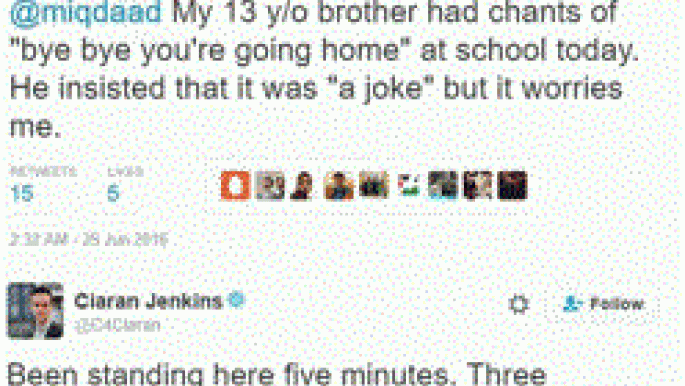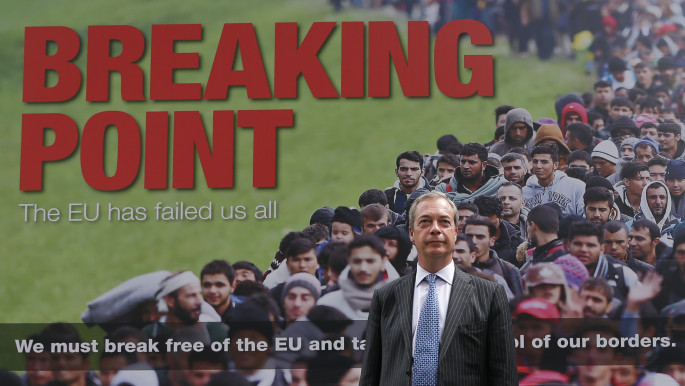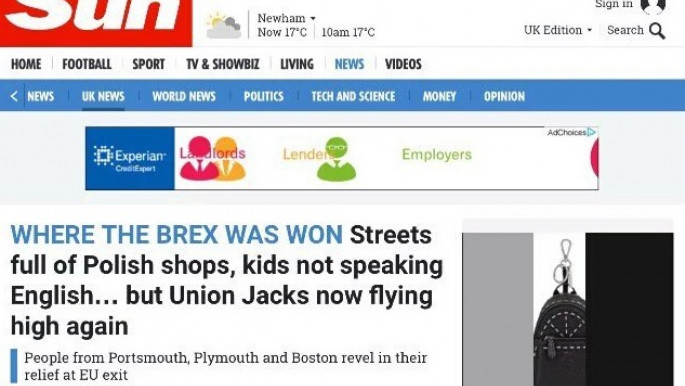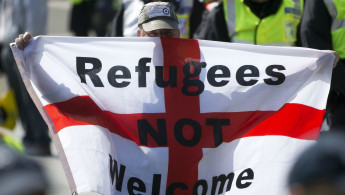Hate crimes surge in post-Brexit Britain
Meanwhile in Manchester – a city world-renowned for its rival football clubs – footage emerged of two young men telling another tram passenger with a North American accent to "get back to Africa," much to the horror of fellow travellers.
The pair also poured alcohol on the gentleman, while also threatening to "waste" him.
The two incidents occurred just days after a Polish cultural centre in London was defaced with racist graffiti, while a number of Poles living in the UK reported receiving cards of abuse that said "no more Polish vermin".
These are but a few instances of Brexit-related hate crimes that have sent shockwaves through Britain in the aftermath of its historic referendum.
The referendum result, it seems, has emboldened many on the British far-right to make overt expressions of their beliefs, in what may be seen as an assertion of their perceived superiority at a time of huge uncertainty for the nation.
Streams of hate
Amid the blinding fog that engulfed the nation as the reality of its decision set in, these acts were more easily shrugged off by those still in denial about the xenophobic overtones of some of the referendum campaigns.
 |
The UK has seen a 57 percent rise in the number of reported hate crimes since the EU referendum |  |
 |
| Twitter users report hate crimes [screenshot] |
According to the National Police Chiefs' Council, the UK has seen a 57 percent rise in the number of reported hate crimes since the EU referendum on Thursday.
Parliamentarian Valerie Vaz spoke out in the aftermath of Birmingham's butcher shop attack, saying that "although it is reported that the police are keeping an open mind over the motive of the attack, since the referendum result we have witnessed a surge of racially-motivated incidents nationally."
"This increase in hate crime is deeply disturbing," she continued.
Brexit and immigration
The rise in racially-motivated abuse is likely to do with some British citizens taking the referendum's 'leave' result as a validation of their own racist and xenophobic ideas.
Indeed, this was certainly the case for the far-right activists who turned out in England's northeastern city of Newcastle with a banner that read "stop immigration, start repatriation".
While mistaken in their understanding of the referendum's implications, considering the messages peddled by politicians and sections of the media, it becomes apparent why this is the case.
Nigel Farage, leader of the Eurosceptic United Kingdom Independence Party, endorsed a campaign billboard during the referendum campaign that was widely criticised as having racist undertones similar to 1930s Nazi propaganda.
The billboard showed a snaking mass of brown-skinned migrants, with "breaking point" splashed across it in bold red, alluding to the large number of migrants and refugees currently seeking asylum in Europe.
 |
| Nigel Farage and his 'Breaking Point' billboard [AFP] |
While refraining from overt displays of xenophobia, many mainstream 'leave' campaigners also used promises about immigration controls to garner votes for the Brexit side.
This includes Conservative Party leadership contender Boris Johnson, who wrote in an article in May that "the only way to take back control of immigration is to Vote Leave".
This placed immigration right at the centre of many voters' minds, while also perking the attention of Britain's far-right.
Many UK media outlets also played a role in setting the political climate, with many tabloids running front-page scare stories about immigration and the refugee crisis.
Following the announcement of the 'leave' win on Friday, the UK's right-leaning Sun newspaper ran a story on its website that seemed to jubilantly celebrate the referendum result as victory over some of Britain's settled immigrants.
 |
| Jubilant: The Sun's article about Britain in Brexit's immediate aftermath [screenshot] |
"Where the Brex was won," read the title of the article published by the Murdoch-owned newspaper.
"Streets full of Polish shops, kids not speaking English... but Union Jacks no flying high again".
This title, with its xenophobic and anti-immigrant undertones, captured the mood within some sections of British society both before and after the vote.
Unchartered territory
After the referendum, Britain now embarks upon a journey of huge uncertainty – with many now anxiously watching as events unfold.
The recent spike in hate crimes does not bode well for community relations in a country that has already been unsettled by international terror attacks and a sudden influx of new arrivals to Europe.
 |
A newly released report by monitoring group Tell Mama reveals a 326 percent increase in hate incidents against British Muslims in 2015 |  |
A newly released report by monitoring group Tell Mama reveals a 326 percent increase in hate incidents against British Muslims in 2015.
"Today we stand in unchartered territory with a 300 percent plus increase in Islamophobic incidents in 2015," said Tell Mama's chair Shahid Malik.
"The statistics paint a profoundly bleak picture of the explosion of anti-Muslim hate both online and on our streets with visible Muslim women being disproportionately targeted by cowardly hatemongers".
Given the recent explosion of post-Brexit xenophobia, many among Britain's minority groups are increasingly concerned about what the referendum result means for them, and how this will affect their lives and positions in British society.



